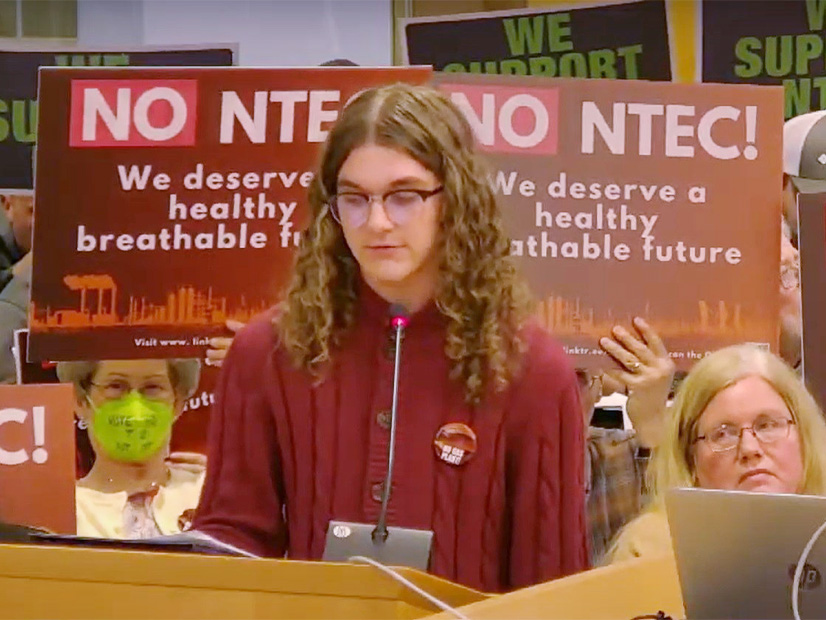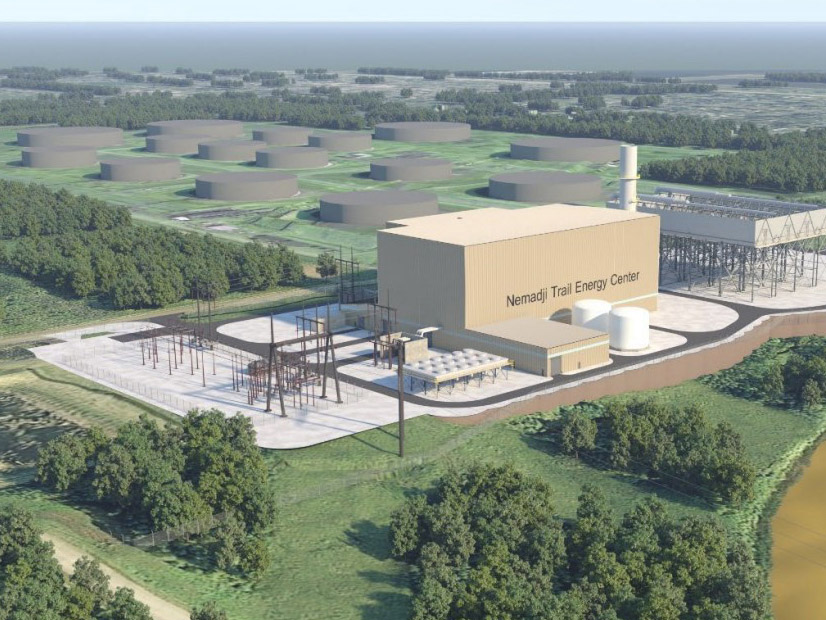
The planned 625-MW gas-fired Nemadji Trail Energy Center in Wisconsin encountered another hitch after the Superior City Council refused to move ahead on zoning changes necessary to break ground on the plant.
At its April 3 meeting, the council voted 5-4 on a roll-call vote to set public hearings required by state law to make land use changes from suburban to heavy industry and vacate streets to allow for the nearly $1 billion gas plant. But the motion, which required six votes to pass per city code, failed, stalling the plant’s development.
Plant co-developer Minnesota Power had requested the land use changes, which would have altered the city’s comprehensive plan.
Construction on the Nemadji Trail plant and associated transmission line has yet to begin, according to a quarterly filing with the Wisconsin Public Service Commission by project partners Minnesota Power, Dairyland Power Cooperative and Basin Electric Power Cooperative.
The vote against the plant appeared to be motivated by a groundswell of opposition from Superior residents. Several people attending the city council meeting spoke out against the plant before the vote, expressing worries over wetland habitat loss, air quality, greenhouse gases that would worsen climate change and stranded asset costs.
Multiple residents expressed disbelief at the U.S. Department of Agriculture Rural Utilities Service’s final supplemental environmental assessment, which found the plant “would not cumulatively contribute to significant adverse air quality impacts.” They also contended that the plant fundamentally contradicts the city’s 2040 comprehensive plan, which calls for waterfront cleanup, preservation and tourism opportunities, among other goals.
Jadine Sonoda, of the Sierra Club’s Wisconsin chapter, said the plant would be “expensive and dangerous decades down the line.”
“Gas has no place in our transition to clean energy, and I really want to underscore that,” Sonoda said.
Milo Peterson, a 15-year-old Superior resident, said, “To put it simply, this project goes against my values … and doesn’t seem like a very considerate thing to do for the environment.”
“I’m asking you to think of my future,” he asked council members.
Superior Mayor Jim Paine said it’s “extraordinary risky” to develop the plant on undeveloped wetland near the banks of the Nemadji River, as the potential for erosion is high.
However, Superior Councilor Brent Fennessey said the city council shouldn’t have used residents’ opposition to the plant to deny an opportunity for a public hearing on land use changes. He said he didn’t think Superior was giving Minnesota Power a fair process.
Paine said allowing hearings would have signaled that Superior was open to rezoning changes to host the plant.
Councilor Jenny Van Sickle said she took exception to Minnesota Power insinuating the plant could be used for hydrogen when the plant’s partners haven’t made any design changes to accommodate the fuel. She also said the design remains out of step with EPA’s suggestion for a form of carbon capture.
‘Disappointed’
Last year, Nemadji Trail’s developers said pushback from environmental groups was partly responsible for delaying the plant’s expected commercial operation date from 2027 to 2028. Construction was set to begin this month — but that was before the city council refused to begin zoning procedures. (See Wisconsin Gas Plant Delayed as Enviros Still Try to Block Project.)
Environmentalists maintain the plant is unnecessary and would increase emissions at a time when utilities need to scale back on polluting resources. They’ve also raised concerns about the plant’s location near wetlands.
In 2022, Wisconsin’s Dane County Circuit Court rejected arguments from the Sierra Club and Clean Wisconsin that the Wisconsin PSC didn’t sufficiently consider the full environmental impact of the plant when it granted it a certificate of public convenience and necessity. The plant has yet to secure permitting approvals from the U.S. Army Corps of Engineers.
Minnesota Power, which would build and operate the plant, has pledged to close its two remaining coal-fired power plants by 2035, generate more than 70% of its energy from renewables by 2030, achieve an 80% reduction in carbon emissions by 2035 and produce only carbon-free energy by 2050. (See Minnesota Power IRP Pledges End to Coal by 2035.)
Minnesota Power has framed Nemadji Trail as a vital supply of backstop power when renewables aren’t available during the clean energy transition.
The utility did not respond to RTO Insider’s request for comment about its plans following the council’s vote. Spokesperson Amy Rutledge previously told local news outlets in a statement that Minnesota Power is “disappointed by the lack of transparency and communication surrounding the hearing, and with the city’s disregard for conducting a fair process involving all interested parties.”
Rutledge said Minnesota Power is evaluating next steps with partners Dairyland and Basin Electric “to ensure we meet our commitment to safe, reliable and affordable power in this clean energy transformation.”
In 2022, MISO wrote a letter to the Rural Utilities Service in support of a loan for Nemadji Trail. The grid operator asked the federal agency to consider its looming generation shortfalls, grid reliability and the plant’s potential role in the RTO’s resource adequacy.




